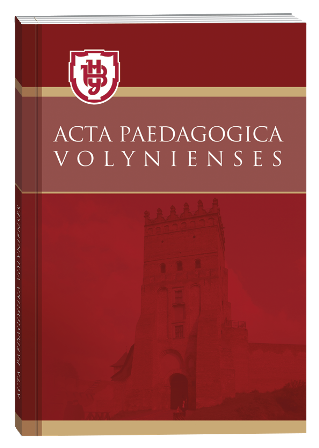PROFESSIONAL READINESS OF PRESCHOOL TEACHERS FOR WORK WITH CHILDREN’S BOOKS
DOI:
https://doi.org/10.32782/apv/2025.1.6Keywords:
children’s book, professional training, preschool teacher, speech environment, speech developmentAbstract
The importance of a high-quality speech environment in preschool educational institutions for the development of children’s speech is emphasized. The value of children’s books in enriching vocabulary, familiarizing with various grammatical structures and speech styles is revealed. The importance of shared book reading as a means of communication between adults and children, which promotes the development of dialogic speech and listening skills, is substantiated.Important aspects such as the preschool teacher’s linguistic sensitivity, which manifests in the ability to respond to the child’s speech needs, support their initiative and stimulate further speech development, are highlighted. Attention is focused on the role of children’s books in the development of vocabulary in early childhood. It is noted that it is during this period that the foundations for further successful learning and development are laid, therefore it is so important to pay attention to the quality of the speech environment and the use of children’s books as an effective tool for vocabulary enrichment. The peculiarities of working with children’s books in a group learning environment, where the role of the preschool teachers as a conversational partner is of particular importance, are considered. The importance of traditional printed publications, books and environmentally friendly printed materials in the educational process is revealed. Their role in the development of the child, the formation of their intellectual abilities, emotional intelligence and environmental awareness is emphasized. Based on the theoretical study of literary sources, pedagogical conditions are proposed that contribute to the effective work of preschool teachers with children’s books, the creation of a favorable educational environment, systematic and consistent familiarization with the book, the use of various methods and techniques of working with the book, an individual approach to each child, cooperation with parents and the professional competence of the preschool teachers. The article is of practical importance for preschool teachers, students of pedagogical specialties and parents who are interested in the issues of working with children’s books and developing the speech of preschool children.
References
Барна Х. Ціннісне ставлення до книги у субкультурі старшого дошкільника. Освіта та розвиток обдарованої особистості. 2015. № 5. С. 5–8.
Ватаманюк Г. Особливості використання дитячої книги в процесі розвитку творчості старших дошкільників. Актуальні питання гуманітарних наук. 2020. Вип. 27(1). С. 224–229.
Ватаманюк Г. Розмаїття дитячих книг – передумова формування читацьких інтересів дошкільників. Педагогічна освіта: теорія і практика. 2017. Вип. 23(2). С. 147–154.
Кас’яненко О. Специфіка ознайомлення з книгою дошкільників з особливими потребами. Педагогіка та психологія. 2015. Вип. 49. С. 86–95.
Маліновська Н. Розвиток зв’язного мовлення дітей старшого дошкільного віку в просторі дитячої книги. Нова педагогічна думка. 2023. № 1. С. 56–60.
Рябошапка О. Вплив книги на формування особистості дитини: історичний аспект. Педагогіка формування творчої особистості у вищій і загальноосвітній школах. 2020. № 70. Т. 3. С. 20–24.
Mandarić Vukušić A., Alajbeg N. Readiness of preschool educators for professional development and training. St open. 2023. Vol. 4. P. 1–10.
Muhinyi A., Stewart A., Rowland C. Encouraging use of complex language in preschoolers: a classroom-based storybook intervention study. Language Learning and Development. 2025. P. 1–19.
Nicolopoulou A., Hale E., Leech K. et al. Shared Picturebook Reading in a Preschool Class: Promoting Narrative Comprehension Through Inferential Talk and Text Difficulty. Early Childhood Educ J. 2024. Vol. 52. P. 1707–1723.
Snow C. What Teachers Need to Know About Language. Harvard : HGSE, 2000. 40 p.
Sonsen J., Broekhuizen M. Quality of the Language-Learning Environment and Vocabulary Development in Early Childhood. Scandinavian Journal of Educational Research. 2020. Vol. 65(2). P. 302–317.
Thorson J., Nesbitt K. Melodies of learning: A prosodic analysis of preschool teachers’ language patterns in the classroom. 2024. Vol. 1. P. 180–184.







